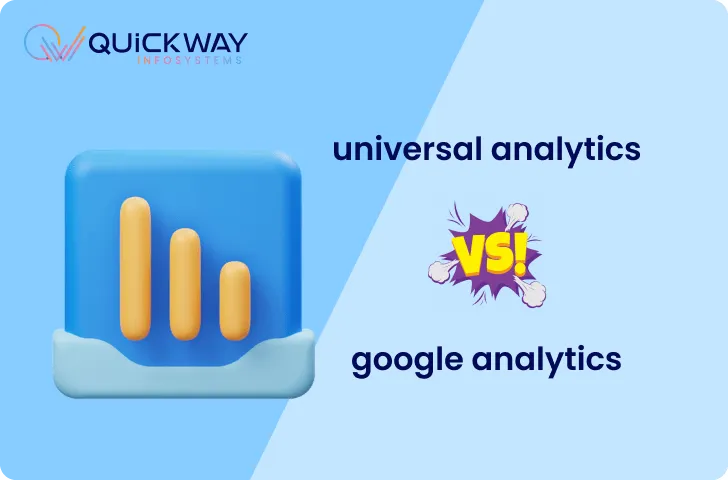Let us understand differences and benefits of Universal Analytics vs. Google Analytics 4, Google Analytics has long been the go-to tool for businesses seeking valuable insights into their online performance. Over the years, Google has introduced various iterations of its analytics platform, with Universal Analytics reigning supreme for quite some time.
However, Google Analytics 4 (GA4) has recently emerged as the latest and more advanced version, promising a wealth of new features and improvements. In this blog, we’ll delve into the differences between Universal Analytics and Google Analytics 4, exploring why GA4 is a beneficial upgrade for businesses.
Universal Analytics: A Brief Overview
Universal Analytics revolutionized web analytics when it was introduced in 2012, becoming the industry standard for businesses seeking valuable insights into their online performance.It offered a comprehensive suite of features and tools that allowed businesses to understand their website’s traffic, user behavior, and marketing effectiveness. At the core of Universal Analytics’ tracking methodology is the use of cookies.
These small text files are stored on a user’s device and are utilized to track their interactions with a website. Universal Analytics employed a “session-based” approach, where user interactions were grouped into sessions based on the presence of a cookie.This session-based tracking allowed businesses to analyze user behavior within specific time frames, measuring metrics such as pageviews, bounce rates, and conversions.
Ready to kick start your new project? Get a free quote today.
While Universal Analytics provided valuable insights, it faced challenges in tracking user behavior accurately in today’s multi-device and multi-channel environment. As users increasingly switched between smartphones, tablets, and desktops, it became difficult to connect their interactions across devices and gain a holistic view of the customer journey.
Additionally, Universal Analytics struggled to attribute conversions accurately, as user actions could occur across different sessions and devices. These limitations prompted the development of Google Analytics 4 (GA4), which aimed to address the evolving needs of businesses in the digital landscape. GA4 introduced a more advanced and comprehensive approach to data collection and analysis, providing businesses with a deeper understanding of their audience and their journey.
Google Analytics 4: A Revolutionary Shift
Recognizing the evolving landscape of digital marketing, Google developed Google Analytics 4 as a response to the challenges faced by Universal Analytics. GA4 represents a paradigm shift in how data is collected, analyzed, and interpreted. It is built around a more intelligent data model that centers on events and user properties instead of the traditional pageview-centric model.
This allows businesses to gain a more holistic view of their customers’ journeys across different touchpoints. While Universal Analytics remains a reliable analytics solution, businesses are encouraged to consider upgrading to GA4 to leverage its enhanced features and capabilities. By transitioning to GA4, businesses can take advantage of its event-driven data model, which captures user interactions as individual events rather than grouping them into sessions.
This shift allows for more accurate tracking of user behavior across devices and channels, providing a more holistic perspective of the customer journey. Furthermore, GA4 incorporates advanced machine learning algorithms, enabling businesses to gain deeper insights into user demographics, interests, and behavior patterns. This user-centric approach empowers businesses to personalize their marketing efforts and create targeted campaigns that resonate with their audience
1. Data Collection and Tracking:
One of the significant differences between Universal Analytics and Google Analytics 4 lies in their data collection and tracking methods. Universal Analytics relies on a session-based model, where user interactions are grouped into sessions and tracked using cookies.In contrast, GA4 adopts an event-driven data model, capturing individual user interactions as discrete events. This event-based approach allows for more accurate tracking of user behavior across devices and channels, providing a more holistic view of the customer journey.
2. User-Centric Approach:
While Universal Analytics focused primarily on analyzing pageviews and website interactions, GA4 takes a more user-centric approach. GA4 utilizes advanced machine learning algorithms to segment users based on demographics, behavior patterns, and interests.This enables businesses to gain a deeper understanding of their audience and personalize their marketing efforts accordingly. By focusing on the individual user, GA4 empowers businesses to deliver more relevant and tailored experiences, ultimately improving engagement and conversion rates.
3. Enhanced Cross-Device Tracking:
With the rise of mobile devices and multiple screens, tracking user interactions across devices has become increasingly important. Universal Analytics struggled to accurately attribute user actions as they switched between devices, often resulting in fragmented data. GA4 addresses this limitation by providing enhanced cross-device tracking capabilities. By leveraging advanced modeling techniques, GA4 can identify and connect user interactions across devices, offering businesses a more comprehensive view of the customer journey and enabling more effective marketing strategies.
Ready to kick start your new project? Get a free quote today.
4. Simplified Implementation:
Implementing tracking codes and tags can be a complex and time-consuming process. Universal Analytics required manual implementation of tracking codes, which could be prone to errors and inconsistencies. GA4 simplifies the implementation process with an enhanced tagging system.Leveraging machine learning, GA4 automates the collection of relevant data, reducing the need for manual tagging. This streamlined implementation process not only saves time but also ensures consistent and accurate data collection.
Benefits of Google Analytics 4:
Numerous advantages are available to businesses looking to enhance their digital analytics expertise with Google Analytics 4. By providing deeper insights and predictive analytics in addition to future-proofing analytics infrastructure, GA4 enables businesses to make data-driven decisions and maintain an edge in a quickly changing digital environment.GA4 provides organizations with a complete and sophisticated analytics solution to optimize their marketing efforts, increase ROI, and provide excellent user experiences thanks to its focus on user privacy and easy interaction with Google’s marketing tools.
Future-Proofing:
As technology continues to advance at a rapid pace, businesses need analytics tools that can keep up with the changing landscape. Google Analytics 4 is designed with a forward-thinking approach, ensuring it remains relevant and adaptable to emerging trends and technologies. By using GA4, businesses can future-proof their analytics strategy, staying ahead of the curve and maintaining a competitive edge in the digital arena.
Deeper Insights and Predictive Analytics:
GA4 incorporates advanced machine learning algorithms that enable businesses to gain deeper insights into customer behavior. By analyzing vast amounts of data, GA4 can identify patterns, trends, and correlations that might go unnoticed with traditional analytics.This allows businesses to make data-driven decisions, optimize marketing strategies, and tailor their customer experiences to improve overall performance and return on investment (ROI). Furthermore, GA4’s predictive analytics capabilities empower businesses to anticipate customer actions and preferences, enabling proactive marketing and personalized experiences.
Improved User Privacy and Compliance:
Data privacy has become a paramount concern for both consumers and businesses. With stricter data protection regulations, such as the General Data Protection Regulation (GDPR) and the California Consumer Privacy Act (CCPA), businesses must prioritize user privacy and comply with these regulations. GA4 addresses these concerns by adopting a privacy-centric approach. It allows users to exercise more control over their data and provides businesses with tools to respect user preferences regarding data collection and processing. Additionally, GA4 integrates seamlessly with Google’s Consent Mode, which enables businesses to implement granular consent mechanisms, ensuring compliance with data privacy regulations and fostering trust with their audience.
Ready to kick start your new project? Get a free quote today.
Seamless Integration with Google Marketing Platform:
GA4 offers seamless integration with other products within the Google Marketing Platform ecosystem, including Google Ads and Google Tag Manager. This integration enables businesses to leverage the full power of Google’s marketing tools and gain a unified view of their marketing efforts. By combining data from different platforms, businesses can uncover valuable insights, optimize advertising campaigns, and measure the impact of their marketing activities more effectively. This integration simplifies the workflow, streamlines data collection and analysis, and ultimately enhances the overall marketing strategy.
How to get started with Google Analytics 4?
Starting from July 1, 2023, standard Universal Analytics properties will cease to process data. However, you will still have access to your Universal Analytics reports for a certain period of time following that date. Please note that only new data will be directed to Google Analytics 4 properties. For 360 Universal Analytics properties, there will be a one-time processing extension granted until July 1, 2024. To begin using Google Analytics 4, there are three options available for editors or administrators:
Option 1: Initiate Analytics data collection for the first time.
Choose this option if you are new to Analytics and wish to start gathering data for your website and/or app.
Option 2: Add Google Analytics 4 to a site already using Universal Analytics (also known as Analytics “classic”).
By using the GA4 Setup Assistant, you can include a Google Analytics 4 property alongside your existing Universal Analytics property. Your Universal Analytics property will continue to collect data, and both can be accessed through the property selector in the Admin area.
Option 3: Add Google Analytics 4 to a website builder platform or CMS (content management system)
If you have a website hosted on a CMS platform such as Wix, WordPress, Drupal, Squarespace, GoDaddy, WooCommerce, Shopify, Magento, Awesome Motive, HubSpot, and others, choose this option.
Ready to kick start your new project? Get a free quote today.
Conclusion
While Universal Analytics has long been a reliable tool for businesses to analyze their online performance, Google Analytics 4 represents a significant leap forward in terms of functionality, insights, and adaptability. With its event-driven data model, user-centric approach, enhanced cross-device tracking, and simplified implementation, GA4 offers businesses a more comprehensive understanding of their customers and their online journeys. By embracing GA4, businesses can unlock deeper insights, make data-driven decisions, and thrive in an ever-evolving digital landscape.
For more tech-trends and news, keep reading our blog. We bring the best industry news to you!
Frequently Asked Questions
Can I use Universal Analytics and Google Analytics 4 at the same time?
If your Universal Analytics property is implemented with gtag. js, you can dual tag for your Google Analytics 4 property in one of the following ways: Use the GA4 Setup Assistant and select the option to “Enable data collection using your existing tags” (This option uses a feature called connected site tags)
What will be new in GA4?
GA4 offers several new features that include mobile app tracking, event-based tracking, better integration with Google products, a customizable interface, cookie-less tracking, and machine learning capabilities.
Can you migrate UA data to GA4?
Yes, We can Migrate UA data to GA4.
Is Google Analytics 4 free?
Similar to Universal Analytics, Google Analytics 4 is a free property type. There are no costs associated with using one (or more) GA4 properties on your account.



